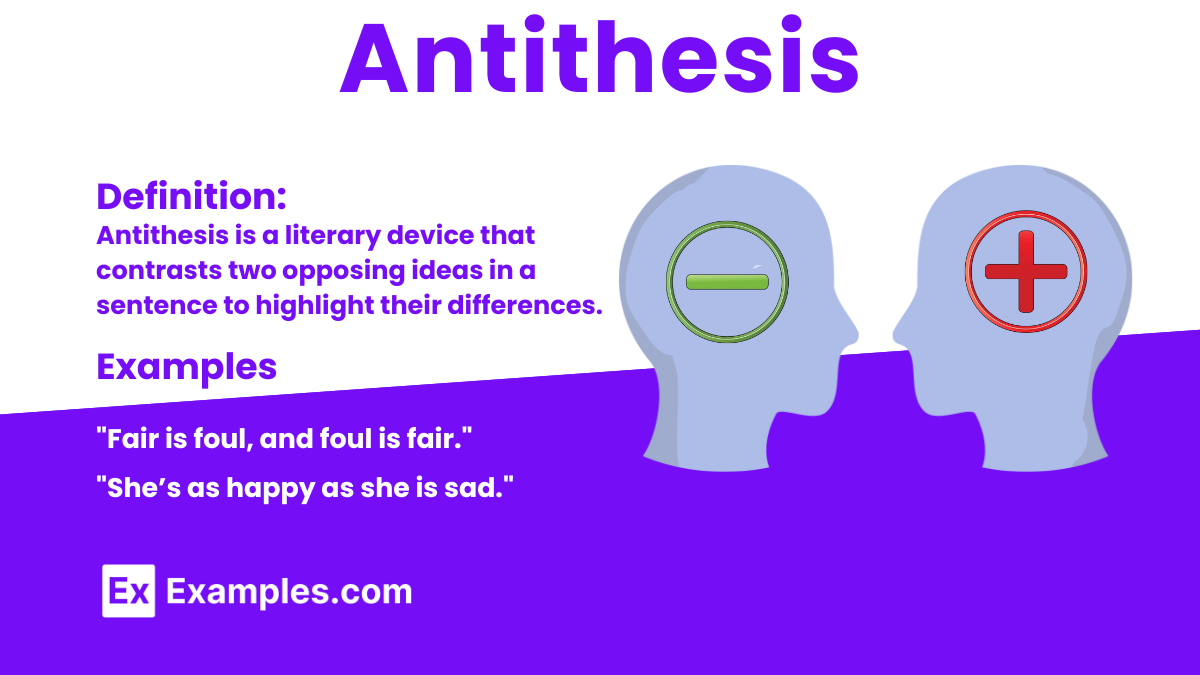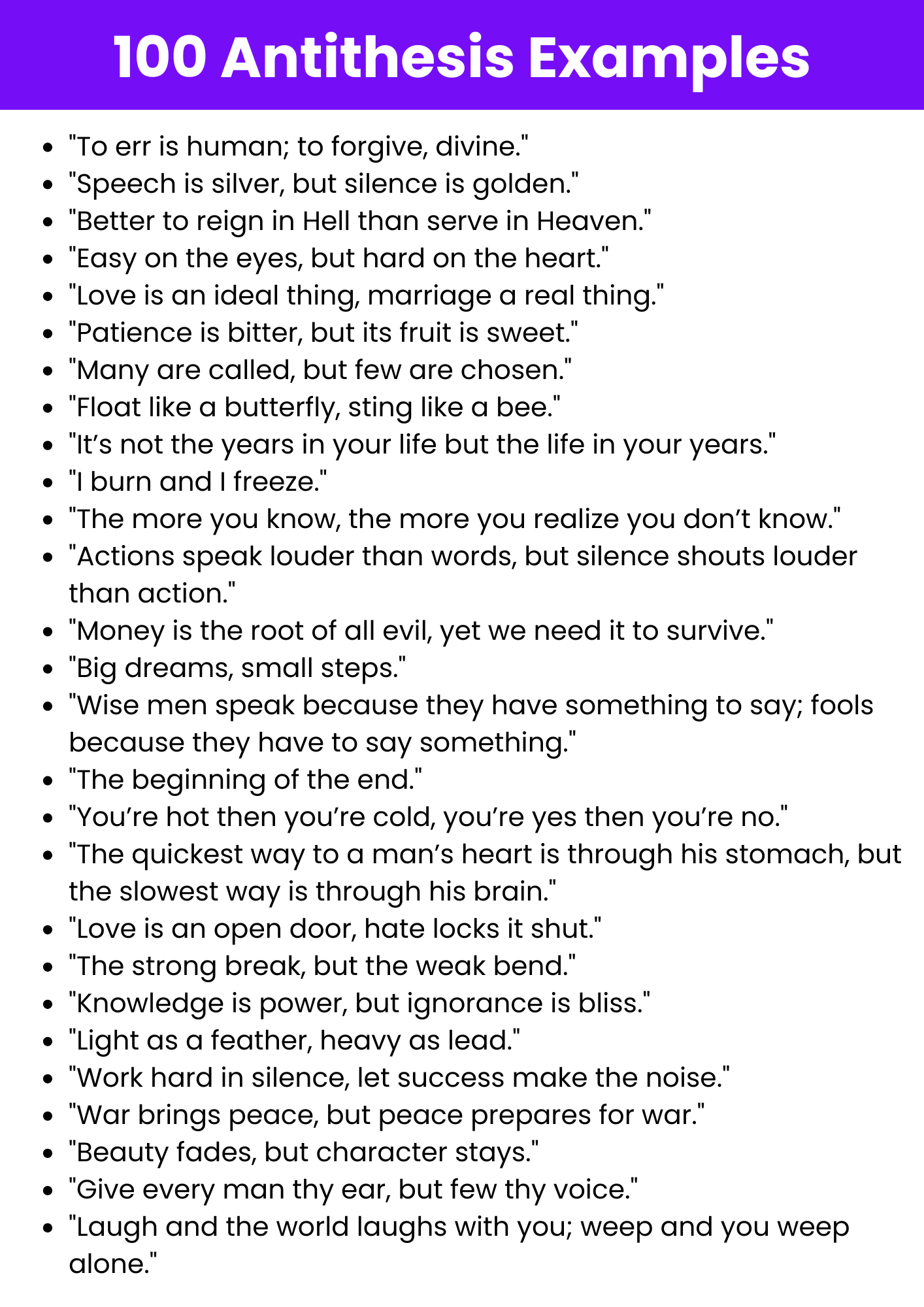Antithesis
What is Antithesis? – Definition
Antithesis is a rhetorical device that juxtaposes contrasting ideas in a balanced or parallel structure. It emphasizes the difference between two opposing concepts to highlight their distinctiveness.

Generated Antithesis Examples

Download Antithesis Examples
Enhance your understanding with our comprehensive PDF guide.
Download PDFExamples of Antithesis
- It was the best of times, it was the worst of times.
- Give me liberty or give me death.
- Ask not what your country can do for you—ask what you can do for your country.
- To err is human; to forgive, divine.
- Speech is silver, but silence is golden.
- Many are called, but few are chosen.
- One small step for man, one giant leap for mankind.
- Better to reign in Hell than serve in Heaven.
- Man proposes, God disposes.
- Ask not what your country can do for you; ask what you can do for your country.
- Give me liberty or give me death.
- It was the age of wisdom, it was the age of foolishness.
- One person’s gain is another’s loss.
- To be or not to be.
- Many are called, but few are chosen.
- Ask not what your country can do for you; ask what you can do for your country.
- Man proposes, God disposes.
- Love is an ideal thing, marriage a real thing.
- It was the best of times, it was the worst of times.
- Better to reign in Hell than serve in Heaven.
- Speech is silver, silence is golden.
- The brave soldier feared nothing.
- He is rich in spirit but poor in money.
- She is strong yet gentle.
- Peace was her reward, chaos his fate.
- The sun was bright, the night was dark.
- His words were a sword, her silence a shield.
- He is joyful yet sorrowful.
- Freedom is his desire, confinement his reality.
- He is both a leader and a follower.
Types of Antithesis
Standard Antithesis
A direct contrast between two opposing ideas presented in a parallel structure.
- It was the best of times, it was the worst of times.
- Give me liberty or give me death.
- Man proposes, God disposes.
- Speech is silver, silence is golden.
- Many are called, but few are chosen.
Implied Antithesis
Antithesis where the opposing ideas are contrasted without explicitly stating the comparison.
- His words stabbed her heart.
- The storm lunged at the boat.
- Her voice is a melody.
- Time marches on.
- Their love burned bright, yet slowly faded.
Extended Antithesis
Antithesis that extends over several sentences or an entire passage, providing a more comprehensive contrast.
- She is courageous yet compassionate, fierce yet gentle, determined yet understanding.
- His mind was a fortress, impenetrable and strong, yet his heart remained vulnerable and open.
- The city thrived with energy and life, while its shadows harbored secrets and fears.
- Freedom brings joy and opportunity, yet it also introduces uncertainty and responsibility.
- Hope shines brightly in the darkest nights, providing a beacon of light amidst the gloom.
Dead Antithesis
Antithesis that has been overused to the point of losing its original impact.
- Peace is not absence of conflict.
- What doesn’t kill you makes you stronger.
- You can’t have your cake and eat it too.
- Beggars can’t be choosers.
- Actions speak louder than words.
Mixed Antithesis
Combining two or more antithetical elements, often resulting in a complex or nuanced contrast.
- He is both a lion and a lamb.
- They lived happily ever after, yet always faced challenges.
- She is wise yet naive, experienced yet inexperienced.
- His silence was deafening, her words were empty.
- The future is uncertain, the past is unchangeable.
Absolute Antithesis
Antithesis that presents stark and unambiguous contrasts between two ideas.
- War is peace.
- Freedom is slavery.
- Ignorance is strength.
- Darkness is light.
- Chaos is order.
Visual Antithesis Examples
Antitheses that create contrasting images or visuals in the reader’s mind.
- A bright sun overshadowing a dark moon.
- A blooming flower in a barren desert.
- A lone tree thriving amidst a forest of shadows.
- A candle burning brightly in the darkness.
- A vibrant rainbow piercing through stormy clouds.
How to Identify/Find Antithesis?
To identify antithesis, look for sentences or phrases that present contrasting ideas in a balanced or parallel structure. Antithesis often highlights the difference between two opposing concepts to emphasize their distinctiveness.
- Look for parallel structures that juxtapose opposing ideas.
- Identify contrasting words or phrases within the same sentence.
- Check if the sentence balances two different concepts.
- Notice the emphasis on the differences between the ideas.
- Look for antithetical elements that enhance the overall message.
How to Use Antithesis?
Use antithesis to create a strong contrast between two ideas, making your writing more persuasive and impactful. Ensure the contrasting elements are clearly presented in a balanced manner to enhance the overall message.
- Choose opposing ideas that highlight the main theme.
- Use parallel grammatical structures to emphasize contrast.
- Integrate antithesis seamlessly into your narrative or argument.
- Ensure the contrast enhances the reader’s understanding or emotional response.
- Avoid overusing antithesis to maintain its effectiveness.
Other Antithesis Examples
Antithesis in Daily Life
Daily life is filled with antitheses that help us convey contrasting thoughts, feelings, and experiences more vividly.
- Light pierces the darkness.
- His generosity contrasts her selfishness.
- Peace and war coexist in the world.
- Success and failure are two sides of the same coin.
- Hope springs eternal, yet despair looms.
Antithesis Examples for Kids
Introduce children to the concept of antithesis with relatable and simple contrasting ideas.
- Big and small.
- Happy and sad.
- Fast and slow.
- Hot and cold.
- Light and dark.
Antithesis Examples for Students
Empower students with antitheses that make learning engaging. Discover how “education is the key to freedom” and “ignorance is the chain to bondage.”
- Knowledge is power; ignorance is weakness.
- Study hard to succeed; neglect to fail.
- Creativity fuels innovation; rigidity stifles progress.
- Collaboration breeds success; isolation breeds failure.
- Understanding builds empathy; misunderstanding breeds conflict.
Antithesis Examples for Poems
Rich and evocative antitheses that enhance the beauty and imagery in poetic language.
- Silent screams echo through the night.
- Hope flickers in the shadows of despair.
- The dawn breaks in the darkness.
- Joy dances with sorrow in her heart.
- The moon shines in the daylight.
Hidden Personification Antithesis Examples
Creative antitheses that bring inanimate objects or nature to life by giving them human-like qualities.
- The wind whispered secrets through the trees.
- The stars winked in the silent night.
- The river laughed as it danced over the rocks.
- The night swallowed the day whole.
- The moon guarded the night’s secrets.
Antithesis Examples About a Tree
Descriptive antitheses that depict trees as more than just plants, highlighting their strength, beauty, and presence.
- The tree stands firm against the raging storm.
- Its roots delve deep into the earth, yet its branches reach for the sky.
- The tree is both a shelter and a battleground.
- Its leaves whisper in the wind, yet remain steadfast in silence.
- The trunk is a pillar of strength, while the branches sway with grace.
Antithesis Examples About Love
Passionate and expressive antitheses that capture the intensity and complexity of love in all its forms.
- Love is passion, hate is indifference.
- Love is light, fear is darkness.
- Love is a burning flame, hate is a cold shadow.
- Love builds bridges, hate burns them.
- Love is a garden that nurtures growth, hate is a desert that destroys.
Explore Other Literary Devices
Elevate Your AP English Preparation
Unlock your potential with our comprehensive AP English exam preparation tools designed to help you excel.
- Extensive Question Bank: Access 900+ exam-like questions for both AP English Language and Literature.
- Expertly Crafted: Questions mirror the structure and difficulty of actual AP exams, ensuring relevant practice.
- Detailed Explanations: Understand your mistakes with clear, concise breakdowns of correct and incorrect answers.
- Personalized Learning: Tailor your study sessions with topic-specific tests and adaptive learning tools.
- Comprehensive Coverage: Master all aspects of the AP English curriculum with extensive guides and resources.
Frequently Asked Questions
-
Why is Antithesis Used in Writing?
Writers use antithesis to emphasize the contrast between two ideas, making a statement more striking and memorable for the reader or audience. -
How Does Antithesis Differ from Oxymoron?
While antithesis contrasts two complete ideas or phrases, an oxymoron combines two contradictory words, like “deafening silence.” -
Is Antithesis Common in Everyday Language?
Yes, phrases like “easy come, easy go” or “love is sweet, but revenge is sweeter” are examples of antithesis used in everyday speech. -
What Effect Does Antithesis Have on the Reader?
Antithesis creates a sense of balance and highlights the contrast, making arguments more persuasive and impactful. -
Can Antithesis Be Used in Poetry and Prose?
Yes, antithesis is used in both poetry and prose to add depth, rhythm, and clarity to the writing, enhancing the overall literary experience.

